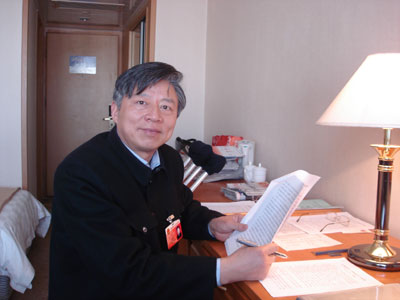The draft Corporate Income Tax Law is now under discussion
at the ongoing NPC session, and will be presented for voting on
March 16, 2007. A provision of particular interest stipulates the
unification or standardization of the rate of taxation at 25
percent, applicable to both domestic and foreign companies. In our
special series on the Corporate Income Tax Law, we'll be
interviewing NPC deputies, entrepreneurs, industry leaders, and
scholars for their take on the proposed unified tax rate, its
significance, and potential impact on China's industry and economy.
The following is our?fourth interview with a Jiangsu Province deputy Jiang Deming. The
fifth interview with a group of entrepreneurs from Jiangsu Province
comes tomorrow.?-- Editor.
?
Encouraging public welfare donations is one way of adjusting income
distribution and should therefore be bolstered by preferential tax
policies, so says Jiang Deming, a deputy attending the Fifth
Session of the Tenth National People's Congress in Beijing, and who
proposes raising tax deductions for such donations, which the draft
Corporate Income Tax Law provides is deductible only if they do not
exceed 10 percent of annual profits.
?
Jiang, a deputy from Jiangsu Province, is disabled after amputation
of one leg. But his disability has not prevented him from
submitting nearly 200 proposals over the past 10 years.
 |
Commenting on the draft Corporate Income Tax Law, Jiang said:
"Reforming the current corporate income tax system is necessary for
the country's market economy system and for the creation of fair
market competition. There's a lot of support for it and I believe
it will be approved."
The draft was submitted to the assembly for examination and
approval on Thursday. Its main points include: a unified tax rate
of 25 percent for both domestic and foreign-funded enterprises; a
20 percent preferential rate for eligible small low-profit
enterprises and 15 percent for hi-tech enterprises; a five-year
transitional period to adopt the new tax rates for certain
foreign-funded enterprises; a standardized policy for actual
expenditure deductions.
?
In 2004, Jiang, together with other NPC deputies, submitted a bill
proposing that corporate tax for domestic and foreign-funded
enterprises be unified. In the last four years, a total of 16
similar bills have been put forward.?
?
"Public welfare issues are closely connected with the
redistribution of social wealth. Donations to this end could help
plug the loopholes of current income distribution systems. This is
why the government should give the matter its full
support."?
?
The draft also stipulates that a company's public donation
expenditures are deductible if they do not exceed 10 percent of its
annual profits.
?
Jiang wants to see the limit raised. He would also like to see
improvements to tax collection methods, which he believes are not
adequately provided for in the draft.?
?
"China"s tax reform is based on the principles of simplifying tax
regimes, broadening tax bases, lowering tax rates and strictly
enforcing administration of tax collection. We've seen the first
three points being taken care of, but not the last one.”
??
The draft law will be put to an open vote on March 16. If approved,
it is expected to take effect on January 1, 2008.
Our previous three?interviews:
HK Deputy: Corporate Tax Increases
Welcomed
Sichuan Deputy: Tax Cut Good News for Chinese
Companies
Standardized Corporate Tax Rates for Level Playing
Field
(China.org.cn by staff reporter Tang Fuchun, March 11, 2007)